Mammograms
According to the American Cancer Society, breast cancer is the most common cancer among women. Thankfully, it is treatable, especially with early detection. Even so, many women avoid scheduling or keeping an appointment for a mammogram.
What is a mammogram?
A mammogram is an X-ray of the breast. Its primary function is to detect breast cancer or other abnormalities in the breast tissue.
When should women start getting mammograms?
General recommendations for cancer screenings vary based on age:
Women older than 30 only need to have a mammogram if they exhibit symptoms, like a lump.
Women between the ages of 40 and 54 should be screened for breast cancer each year.
Women over age 55 should be screened for breast cancer every other year.
If you have a family history of breast cancer, your Primary Care Physician (PCP) may recommend beginning screenings sooner or more frequently.
Why are mammograms so important?
Mammograms can detect abnormalities sooner than a manual breast exam, making them a great first line of defense. According to the American College of Radiology, mammography has helped reduce breast cancer mortality in the U.S. by nearly 40% since 1990.
Although mammograms are a key part of breast cancer prevention, many women put off their mammograms or avoid them entirely. Sound familiar? You’re not alone.
According to a new study from MedStar Health, here are the most common reasons women don’t get mammograms (and why you should rethink getting that appointment on your calendar):
“I haven’t gotten around to it.”
Life is busy, and it’s easy to let preventive care fall by the wayside, especially when taking care of family. However, your health is important, too. Next time you make an appointment with your PCP, mention that you’re due for a mammogram and schedule it.
“I’ve had normal mammograms in the past,” or “Breast cancer doesn’t run in my family.”
If breast cancer isn’t a concern for you, missing a mammogram or two doesn’t seem like a big deal. However, the risk of developing cancer increases with age, regardless of family history. It’s critical to continue getting tested to ensure you are healthy.
“Mammograms are painful.”
Many women complain that mammograms are uncomfortable or painful, but they don’t have to be. If you’re avoiding your mammogram due to pain, talk to your PCP about your options.
Avoid scheduling your mammogram the week before your period to avoid sensitivities from hormonal changes. Take acetaminophen before the appointment. If the position of the imaging plates is uncomfortable,
ask the technician to adjust them.
"I’m afraid. What if they find something?”
Anxiety around medical testing is common, and understandable, particularly when it comes to tests that can reveal something like cancer.
Talk to your PCP about your concerns. Bring a loved one with you for moral support before and after the test.
Ready to get healthy?
Sign up for our digital newsletters to receive health tips, recipes, success stories for inspiration and information about new doctors to help you on your journey to better health.
Genesis HealthCare System’s Health and Wellness content conveniently provides accurate and helpful information. Your health history and current health may impact suggestions provided through our Health and Wellness content. Although we hope this information is helpful, it is not a substitute for your doctor's medical advice. Before making any significant changes, please consult your doctor.
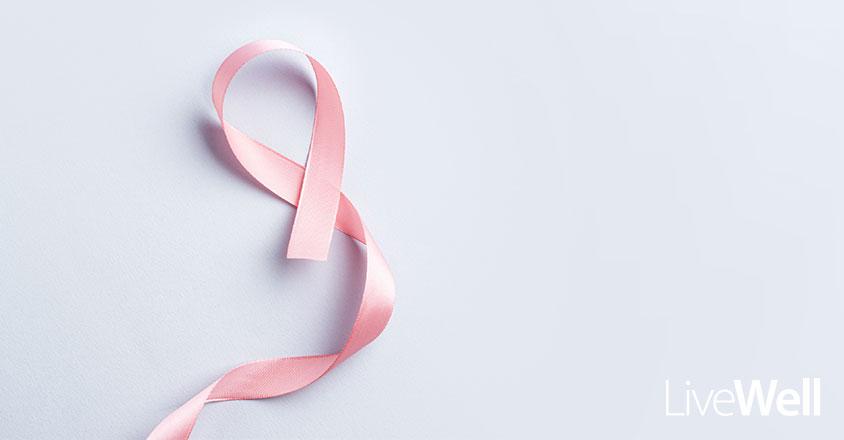
According to the American Cancer Society, breast cancer is the most common cancer among women. Thankfully, it is treatable, especially with early detection. Even so, many women avoid scheduling or keeping an appointment for a mammogram.
Navigating the fall time change
As crisp autumn air returns and daylight becomes shorter, the time change can impact our overall
well-being. While gaining an extra hour of sleep is a bonus, the adjustment can disrupt our body’s internal clock.
We can proactively alleviate these concerns and embrace the seasonal shift as we set our clocks back one hour.
Time change impact
The end of daylight saving time is the first Sunday in November. According to the National Institute of General Medical Sciences, this change can affect our circadian rhythm, the natural internal process regulating the sleep-wake cycle.
Disruptions to this cycle can lead to:
Decreased energy levels.
Impaired cognitive function.
Mood changes.
Sleep disturbances.
Tips to navigate
1. Healthy sleep habits
Adjust your bedtime ahead of a time change to 15-20 minutes earlier, according to the Sleep Foundation.
Create a sleep-friendly environment by keeping bedrooms cool, dark and quiet.
Reduce exposure to electronics an hour before bedtime.
Maintain a consistent wake-up time to help regulate your internal clock.
2. Maximize light exposure
Spend time outdoors to reset your circadian rhythm and improve alertness.
Lack of sunlight contributes to lower amounts of vitamin D, according to the University of Texas Southwestern Medical Center. This is linked to sadness, depression and fatigue. Consider using a light therapy box if you have limited access to sunlight. This can be beneficial for those with seasonal affective disorder.
Aim for 30 minutes of moderate exercise five days a week to boost energy and improve sleep. Incorporate outdoor activities like hiking, biking, running or walking.
3. Mindful eating
Maintain a diet with fruits, vegetables, whole grains and lean proteins to support your overall health and energy levels.
Avoid consuming caffeine and alcohol too close to bedtime.
4. Mental health check
Incorporate deep breathing techniques, meditation or yoga to manage stress and anxiety.
If the time change significantly impacts your well-being, consider talking with a mental health professional.
Embrace a positive mindset
While the time change can pose challenges, it also presents opportunities to improve daily habits. Take a moment to prioritize your health, stay active and enjoy the new season. Minor adjustments can make a big difference in maintaining our physical and mental well-being.
Go to genesishcs.org for more wellness resources.
Ready to get healthy?
Sign up for our digital newsletters to receive health tips, recipes, success stories for inspiration and information about new doctors to help you on your journey to better health.
Genesis HealthCare System’s Health and Wellness content conveniently provides accurate and helpful information. Your health history and current health may impact suggestions provided through our Health and Wellness content. Although we hope this information is helpful, it is not a substitute for your doctor's medical advice. Before making any significant changes, please consult your doctor.
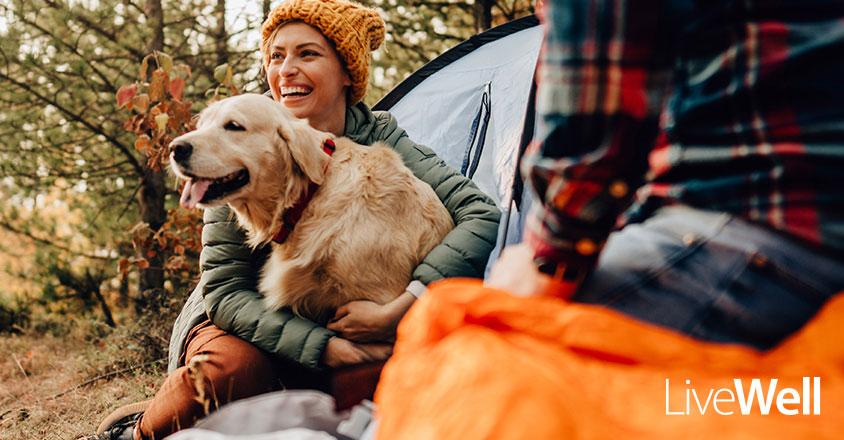
While gaining an extra hour of sleep is a bonus, the adjustment can disrupt our body’s internal clock.
Flu season is here
Colder weather is often associated with some of our favorite activities, such as football season, pumpkin patches and the holidays. Chillier weather can also bring fevers, chills, coughs, body aches and sore throats, all symptoms of influenza.
One of the simplest ways to prevent the flu is to get a yearly flu shot. The U.S. Centers for Disease Control and Prevention (CDC) states that the annual vaccination has several advantages, including minimizing the risk of flu, time spent in the hospital and flu-related deaths.
Each year, there are different flu strains. The CDC recommends getting a flu shot in October to prepare for the peak season starting in December.
According to the CDC, anyone six months of age or older should receive the seasonal flu shot, although there are some rare exceptions. There are different types of flu shots for different age groups.
Adults 65 years old or older should receive a specific flu shot, which will give them more protection from the flu. Talk to your doctor if you have questions about the best flu vaccine for you.
Be mindful of others
If you don’t get the flu shot for yourself, get it for someone else. Our well-being is a priority, but we also want to ensure our friends and family are healthy. For example, children, pregnant women, grandparents and those with chronic health conditions, such as diabetes or cancer, are at a higher risk for flu complications.
Many pharmacies and local health departments offer flu shot clinics. At Genesis Pharmacies, our Taylor, Maysville, New Concord, Roseville and Somerset locations offer the flu shot. Most insurance companies cover the flu shot and your healthcare provider can help you prepare for this year’s flu season.
Visit genesispharmacies.org for more information.
Ready to get healthy?
Sign up for our digital newsletters to receive health tips, recipes, success stories for inspiration and information about new doctors to help you on your journey to better health.
Genesis HealthCare System’s Health and Wellness content conveniently provides accurate and helpful information. Your health history and current health may impact suggestions provided through our Health and Wellness content. Although we hope this information is helpful, it is not a substitute for your doctor's medical advice. Before making any significant changes, please consult your doctor.
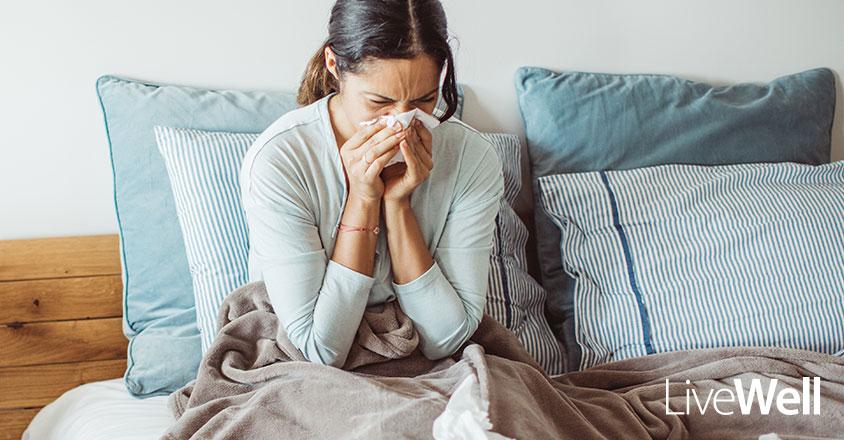
Each year, there are different flu strains. The CDC recommends getting a flu shot in October to prepare for the peak season starting in December.
You could save your life with a colonoscopy
In 2018, the American Cancer Society lowered the recommended age from 50 to 45 for colon cancer
screening. The change was made because more middle-age and young adults are getting colon cancer.
There are multiple colon cancer screening options. However, colonoscopies continue to be the best.
Ready to get healthy?
Sign up for our digital newsletters to receive health tips, recipes, success stories for inspiration and information about new doctors to help you on your journey to better health.
Genesis HealthCare System’s Health and Wellness content conveniently provides accurate and helpful information. Your health history and current health may impact suggestions provided through our Health and Wellness content. Although we hope this information is helpful, it is not a substitute for your doctor's medical advice. Before making any significant changes, please consult your doctor.

The American Cancer Society has lowered the recommended age to 45 for colon cancer screening.
Breast cancer screening can save your life
According to the American Cancer Society:
Breast cancer is the most common cancer in women in the United States, except for skin cancers.
Every 1 in 8 women will develop breast cancer in their lifetime.
5-year survival rates for breast cancer are:
- 99% if detected early before it spreads.
- 86% if it spreads to lymph nodes or nearby structures.
- 30% if it spreads to distant parts of the body, like lungs, liver or bones.
Screenings
National Comprehensive Cancer Network guidelines recommend:
All women age 40 and older at average risk of breast cancer should have an annual screening mammogram.
All women should have a clinical breast examination by a physician every year, along with a monthly self-examination.
Women with higher-than-average risk of breast cancer should have a clinical breast examination by a physician every 6 to 12 months and should consider a high-risk screening of an annual breast MRI along with an annual mammogram.
Talk with your doctor
Discuss your risk for breast cancer and a plan for a screening mammogram with your Primary Care Physician or your OB/GYN.
For more information on breast, colorectal, lung and prostate cancer screenings, visit genesishcs.org/screenings.
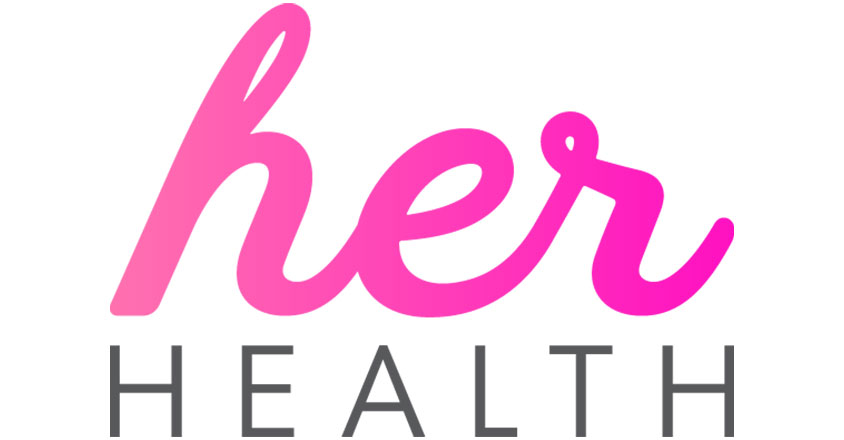
Want to learn about women’s health?
HerHealth is our new women’s health newsletter. Sign up today with your email to receive the next issue.
Genesis HealthCare System’s Health and Wellness content conveniently provides accurate and helpful information. Your health history and current health may impact suggestions provided through our Health and Wellness content. Although we hope this information is helpful, it is not a substitute for your doctor's medical advice. Before making any significant changes, please consult your doctor.
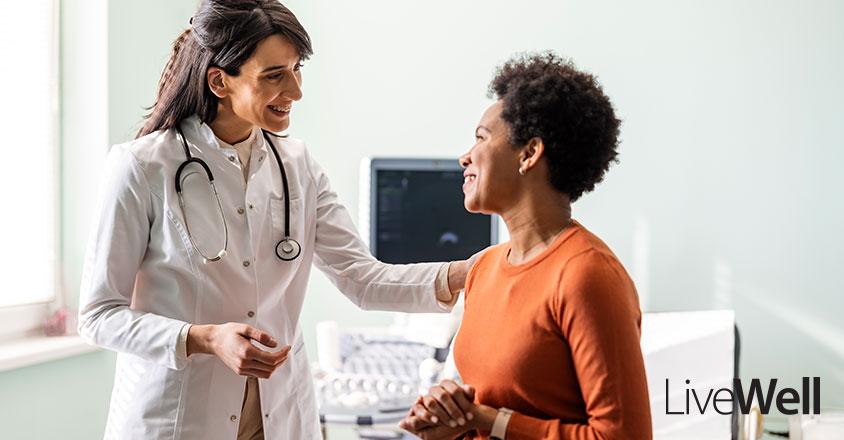
Breast cancer is the most common cancer in women in the United States, except for skin cancers.
Prediabetes is like a warning light
Some people tend to ignore check engine lights or put off changing a furnace filter when the sensor goes off. One warning you can’t afford to ignore is a prediabetic diagnosis.
What is prediabetes?
Prediabetes is usually the result of an A1C test that indicates your blood sugar is higher than normal, between 5.7% and 6.4%. A result of 6.5% or higher is generally accepted as a diabetes diagnosis.
Blood sugar is measured through an A1C test that reveals your average blood sugar level over the previous three months, so you can’t cram for this test at the last minute by ignoring desserts for a week. Consider prediabetes as your last chance to make changes to keep from becoming diagnosed with diabetes.
What to do if you have prediabetes?
Hearing that you have prediabetes is similar to a rare do-over opportunity in life. Typically, if you are willing to change your lifestyle habits, you can often lower your A1C and prevent or at least delay diabetes. The best way to lower your A1C is to:
- Eat healthy foods.
- Be physically active each day.
- Maintain a healthy weight.
- Don’t smoke.
- Control blood pressure and cholesterol.
Risk factors
For optimal health, you should try to live a healthy life and avoid reaching prediabetes status, especially if you fit into a high-risk category. According to the Genesis Diabetes & Nutrition Education Department, diabetes risk factors include:
- Being overweight.
- Having increased amounts of stress.
- Certain ethnicities.
- Being over the age of 45.
- Sedentary lifestyle.
- Family history.
- Having diabetes during pregnancy.
Stay informed
Most insurance plans will cover an A1C test as part of an annual wellness visit. If you have any of the risk factors, talk to your doctor for a plan to prevent prediabetes or reverse your trend if you have been diagnosed with prediabetes.
Want to prevent diabetes? Indulge on our tips and not desserts.
For more information on staying healthy, especially avoiding a prediabetes or diabetes diagnosis, try our online content. We have several articles that provide health tips backed by research.
-
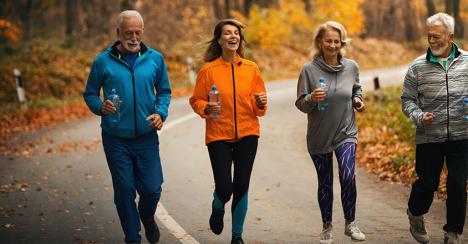 Keys to preventing Type 2 diabetes
Keys to preventing Type 2 diabetesSmall changes in diet, exercise and weight management can help prevent diabetes.
Read now -
 Live the Sweet Life … Without Sugar
Live the Sweet Life … Without SugarSugar typically makes things taste better and last longer. Continue to enjoy food and live healthier with these tips.
Read now -
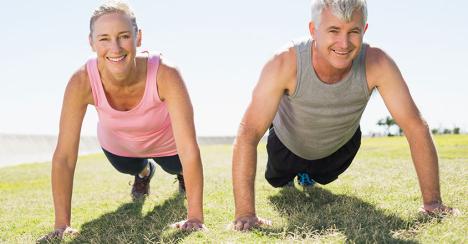 Your body is the only workout equipment you need
Your body is the only workout equipment you needGrab your shoes, a space with room to move and use your bodyweight to get fit.
Read now
Ready to get healthy?
Sign up for our digital newsletters to receive health tips, recipes, success stories for inspiration and information about new doctors to help you on your journey to better health.
Genesis HealthCare System’s Health and Wellness content conveniently provides accurate and helpful information. Your health history and current health may impact suggestions provided through our Health and Wellness content. Although we hope this information is helpful, it is not a substitute for your doctor's medical advice. Before making any significant changes, please consult your doctor.
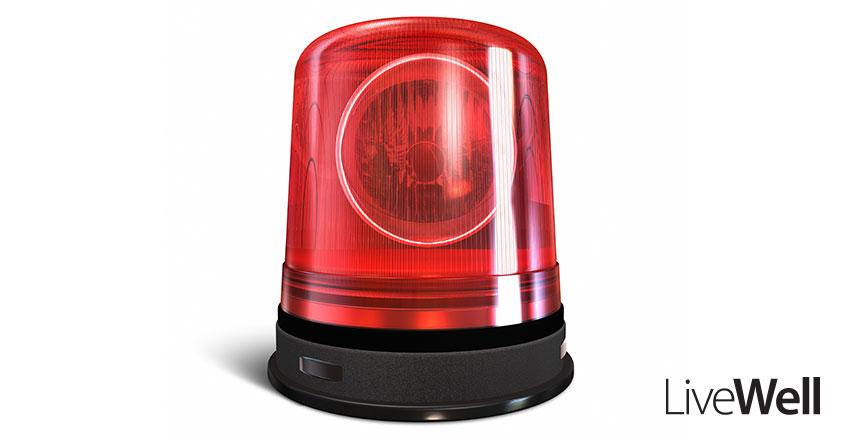
Prediabetes is usually the result of an A1C test that indicates your blood sugar is higher than normal. Learn about the risk factors and ways to prevent diabetes.
“I thought I had the flu.”
You are probably familiar with numbness in your left arm and amcrushing feeling in your chest as heart attack warning signs. But what if you don’t feel like an elephant is sitting on your chest? Sometimes, the symptoms are subtle and people ignore them, thinking they have indigestion or are getting the flu. This is especially true for women.
Know the warning signs and call 911 immediately if you experience them.
Heart attack symptoms in women:
Chest pain, but not always
Pain or pressure in the lower chest or upper abdomen
Jaw, neck or upper back pain
Nausea or vomiting
Shortness of breath
Fainting
Indigestion
Extreme fatigue
Heart attack symptoms in men:
Squeezing chest pressure or pain
Jaw, neck or back pain
Nausea or vomiting
Shortness of breath
If you have heart attack symptoms:
Call 911 immediately.
The best treatment for a heart attack is to prevent one by taking care of your heart. Your Primary Care Physician can refer you to one of several Genesis heart care locations where you can learn more about diet, exercise and controlling your risk factors. Our Heart & Vascular Institute is at the Genesis main campus in Zanesville with additional offices are in Coshocton, Cambridge and Somerset.
To learn more, visit genesishcs.org/heart.
Ready to get healthy?
Sign up for our digital newsletters to receive health tips, recipes, success stories for inspiration and information about new doctors to help you on your journey to better health.
Genesis HealthCare System’s Health and Wellness content conveniently provides accurate and helpful information. Your health history and current health may impact suggestions provided through our Health and Wellness content. Although we hope this information is helpful, it is not a substitute for your doctor's medical advice. Before making any significant changes, please consult your doctor.
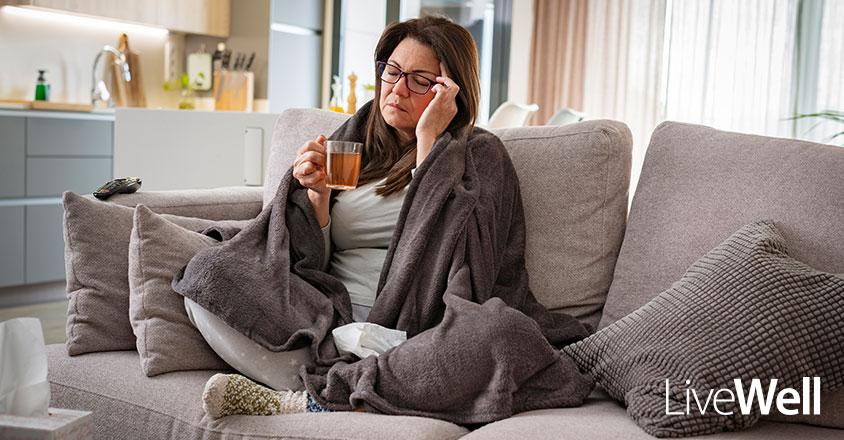
Sometimes, the symptoms of a heart attack are subtle and people ignore them, thinking they have indigestion or are getting the flu. This is especially true for women.
Bone-a-fide
Osteoporosis is a skeletal disorder that occurs when a body loses too much bone or doesn’t make enough bone. Bone tissue deteriorates, leading to an increased risk of fracture. The Bone Health and Osteoporosis Foundation states that 54 million Americans have osteoporosis, most of them elderly.
Osteoporosis is often called a “silent” disease since the first symptom is often a broken bone. However, if you experience any of the following, share your concerns with your primary provider. They may refer you to a orthopedic physician.
Symptoms
- Sloping shoulders
- Curvature of the back
- Height loss
- Back pain
Testing
Osteoporosis is confirmed with a bone density test. The U.S. Preventive Services Task Force recommends that women aged 65 and older and postmenopausal women with an increased risk of osteoporosis have a bone density test. A conversation with your doctor will help you decide when to have the testing done.
Thankfully, the test is painless. It’s like having an X-ray. The test will measure your bone density and compare it to the bones of an average, healthy adult. Your result is called a T-score. The T-score will let your doctor know whether you have healthy bones, osteoporosis or osteopenia, which is low bone density, but not as severe as osteoporosis.
Treatment
Based on your T-score, your doctor may propose a treatment plan.
- Possibly prescribe medications to build bone mass and prevent bone loss.
- Increase your calcium.
- Make sure you are getting enough vitamin D.
- Encourage physical activity.
The same things your doctor recommends for treatment are also ways to prevent osteoporosis.
Prevention
- Maintain a healthy weight.
- Eat foods that support bone health, like calcium, vitamin D and protein.
- Choose more low-impact activities like walking, swimming and biking over high-impact activities.
- Cut back on smoking and drinking. Chronic use of both is proven to weaken bones.
Talk to your primary care physician about the best ways to avoid this disease.
Learn more about the Genesis Orthopedic Center at Genesishcs.org/orthopedic.
Ready to get healthy?
Sign up for our digital newsletters to receive health tips, recipes, success stories for inspiration and information about new doctors to help you on your journey to better health.
Genesis HealthCare System’s Health and Wellness content conveniently provides accurate and helpful information. Your health history and current health may impact suggestions provided through our Health and Wellness content. Although we hope this information is helpful, it is not a substitute for your doctor's medical advice. Before making any significant changes, please consult your doctor.
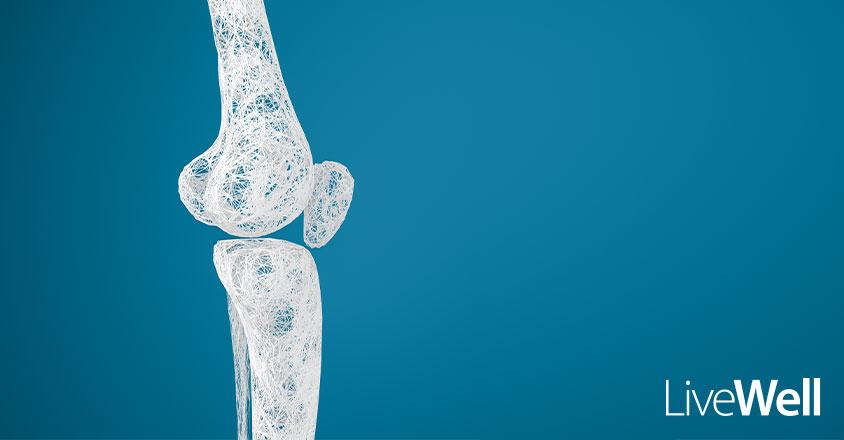
Information on the symptoms, treatment and prevention of osteoporosis.
Tips to help women stay healthy
Hey you, it’s me – your body. While I’m feeling pretty good right now, we can’t take things for granted. You and I need to get on the same page to make sure things don’t start going downhill. Can you help by following these tips? It’ll make my job so much easier – and more enjoyable for both of us.
Get regular checkups and screenings
Seeing your family doctor or OB/GYN on a regular basis is vitally important. Your doctor is your partner in keeping you on a healthy path or in managing chronic health conditions like diabetes or high blood pressure. Your doctor will also make sure you get the routine screenings essential for early detection of disease, like mammograms, Pap smears and blood work.
Get at least 30 minutes of daily physical activity
Exercise helps you feel your best – plus, it helps keep your weight in check. It can improve the quality of your sleep and helps prevent bone loss and osteoporosis, too.
Get 7 to 9 hours of sleep
A good night’s sleep helps you feel sharper, elevates your mood and can help prevent other health issues.
Eat healthy
Eating healthy and including more fresh fruit and vegetables in your diet can help you maintain a healthy weight, promote strong bones and teeth, and reduce the risks of cancer, diabetes, heart disease and strokes. Plus, it improves your mood and memory.
Reach and maintain a healthy weight
When you’re at a healthy weight, you lower the risk of heart disease, stroke, high blood pressure and diabetes, and also help reduce the risk of many different cancers.
Get help to quit smoking
If you quit smoking, nearly everything improves. You’ll have healthier blood, heart and lungs. Your bones, muscles and immune system will be stronger, too. Plus, you will have clearer skin and fresher breath.
Limit alcohol to one drink or less
Limiting alcohol to one drink or less per day helps reduce the risk of some cancers, liver disease, heart disease and high blood pressure.
Use drugs only as prescribed
Prescription or illegal drug use and misuse can damage your body and mind. If you think you may have a problem, get help sooner rather than later.
Drive safely
In the U.S., road crashes are the greatest killer of women and men under age 55. Wearing a seatbelt greatly reduces your risk. Also, texting and driving is six times more dangerous than driving while intoxicated. Pull over or wait until you get home.
Genesis HealthCare System’s Health and Wellness content conveniently provides accurate and helpful information. Your health history and current health may impact suggestions provided through our Health and Wellness content. Although we hope this information is helpful, it is not a substitute for your doctor's medical advice. Before making any significant changes, please consult your doctor.
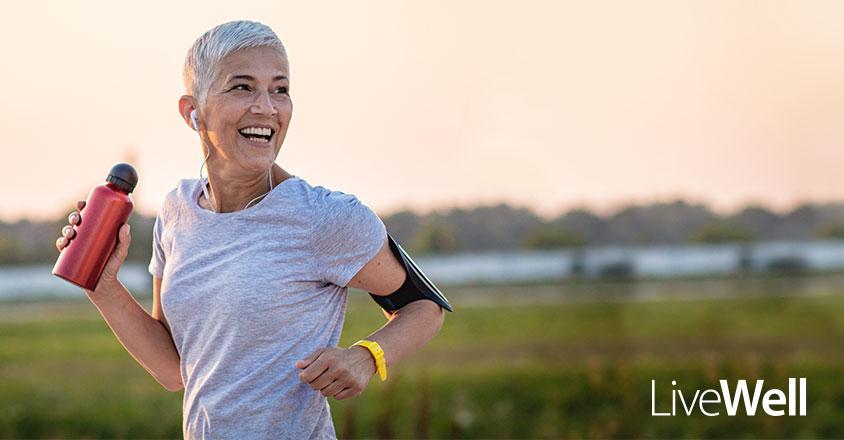
Keep yourself healthy by following these tips to stay on top of women's health.
Healthy homemade popsicles
Ingredients:
• 5 ounces of strawberries (about 6 medium strawberries)
• 6 ounces of blueberries (about 1 ¼ cups)
• 7 tablespoons of granulated sugar
• 5 tablespoons of lime juice
• 1 ounce of ice cubes (about 3 ice cubes)
• 10 tablespoons of water
Instructions:
1. Red (strawberry) layer:
- Cut 5 ounces of strawberries and place them in a small saucepan with 2 tablespoons of granulated sugar and 2 tablespoons of water.
- Boil on medium-high heat, then simmer for 5 minutes. Blend until smooth, then add 1 tablespoon of lime juice and 1 ounce of ice cubes. Stir until the ice is melted and the mixture cools.
- Divide the puree among 6 popsicle molds, tapping them to remove air bubbles. Freeze for at least 1 hour and while that’s freezing, move on to the next layers.
2. White (lime) layer:
- Place 3 tablespoons of lime juice and 2 tablespoons of granulated sugar in a liquid measuring cup and stir until the sugar is completely dissolved. Add enough cold water to make 3/4 cup lime mixture.
3. Blue (blueberry) layer:
- Combine 6 ounces of blueberries, 3 tablespoons of granulated sugar and 2 tablespoons of water in a saucepan.
- Boil on medium heat, then simmer for 5 minutes. Blend until smooth, adding 1 tablespoon of lime juice. ° Chill until needed.
4. Combining the layers:
- When the red layer is completely solid, divide the white mixture evenly among the molds. Freeze until mostly frozen, about 45 minutes. Insert the popsicle sticks and freeze until completely solid, about 30 minutes.
- Divide the blue mixture evenly among the molds. Freeze until completely solid, at least 2 hours. When ready to serve, run lukewarm water over the outside of the molds so they release easily.
5. Enjoy.
Nutritional information:
• Calories: 85
• Total fat: 0.2 g
• Sodium: 2.1 mg
• Cholesterol: N/A
• Carbohydrates: 21.9 g
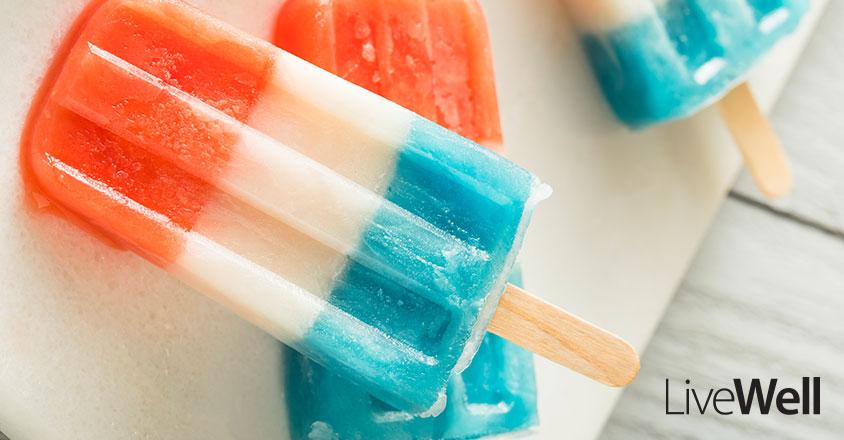
You will love this creative summertime treat.